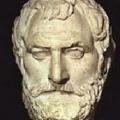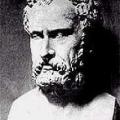2 - Infinity and Beyond: Anaximander and Anaximenes
Posted on
Peter discusses two very early Greek philosophers, both from Miletus: Anaximander and Anaximenes.
Themes:
Further Reading
• K. Algra, "The Beginnings of Cosmology," in A.A. Long, The Cambridge Companion to Early Greek Philosophy (Cambridge: Cambridge University Press, 1999), 45–65.
• J. Engman, “Cosmic Justice in Anaximander,” Phronesis 36 (1991), 1-25.
• G. Freudenthal, “The Theory of the Opposites and an Ordered Universe: Physics and Metaphysics in Anaximander,” Phronesis 31 (1986), 197-228.
• U. Hölscher, "Anaximander and the Beginnings of Greek Philosophy," D.J. Furley and R.E. Allen (eds), Studies in Presocratic Philosophy, vol.1 (1970), 281–322.







Comments
Satire and sources?
These early cosmological theories have so little evidence for them, and are so 'way out', that, surely, Anaximander and Anaximines must have been attacked for their views? Socrates was made fun of by Aristophanes in his play "Clouds". Were the pre-socratics also subject to satire? More seriously, were they put on trial, also like Socrates?
Why isn't there more material from the pre-socratics? Is it just lack of care that led to the destruction of their written materials? Did they write much down, or was theirs mostly an oral tradition? Are 'book burners' to blame?
In reply to Satire and sources? by Malcolm
Satire and sources
In reply to Satire and sources by Peter Adamson
So much is lost
For instance, what we have left of Aristotle are his 'lecture notes', when he is said to have produced so many superb, finished dialogues that Cicero called them 'a river of gold'. Also there is very little left of Epicurus, surviving only in scraps when he is reputed to have written more than 300 books. When I look at the 'Pali canon' and the 'Old Testament', I do wonder why more couldn't have been saved of Epicurus and the Presocratics.
In reply to So much is lost by Malcolm
What remains
Yes, I agree; Chrysippus would be an even more striking example, as he has no surviving works. At least with Epicurus we do have his letters preserved by Diogenes Laertius.
Balance
I got chills when I heard Anaximander's argument for why the Earth is stationary. I feel like that represents a huge step in the complexity of thought, not unlike something out of 2001: A Space Odyssey.
In reply to Balance by Tim
The day the earth stood still
Yes, good isn't it? I vaguely recall that Jonathan Barnes refers to this as the earliest use of the principle of sufficient reason in the history of philosophy, though I may be remembering that wrong.
Indefinite first principle
I love this idea of the first principle, the indefinite/infinite since there must be something eternal to give rise to anything else - something can't come from nothing and for anything to be acted upon must have something in common with the thing acting on it.
So let me get this straight. Anaximander says the definite comes from the indefinite. Necessity within the indefinite brings things into being out of the indefinite and injustice (irrationality/unreason) sends things out of being back into the indefinite. All this based on where the being is (position representing time since time is an illusion) relative to itself in the Indefinite under the other illusion of cycle (cycle cannot exist in infinity except as expansion and contraction within being)
The brackets are just my comments - not my interpretation of his statements
Anaximander and Parmenides
So, Anaximander said that the heavenly bodies, as well as the waxing and waning of the moon, was due to "glimpses" of the fire. This sounds like the heavenly bodies and the moon which we see do not really exist, but are really illusions created by these glimpses of the fire, which does exist. Unless I'm misunderstanding, this sounds like Anaximander is saying that our senses are not completely reliable for understanding the cosmos, which has strong resonance with Parmenides. Was it possible that Parmenides was at all influenced by Anaximander, or would he place him entirely in his "Ways of Opinion?"
In reply to Anaximander and Parmenides by Zachary
Anaximander-Parmenides
I don't think that Anaximander is necessarily saying anything skeptical there - the point isn't that the celestial bodies are illusory, he just wants to give some explanation of the lights we are seeing. In other words, it's not like there is some kind of more "apparent" phenomenon he is trying to debunk, as far as I can see. Broadly speaking therefore I think he is the sort of thinker Parmenides is responding to and trying to improve on in the Way of Opinion; I'd say that the revisionist tendency of the Way of Truth (the message that what you think about the world is all wrong) can better be traced back to Xenophanes and, especially, Heraclitus. However the Milesian emphasis on unity is of course important as a precursor for Parmenides, and the idea of the indefinite also plays a role, though moreso in Parmenides' follower Melissus.
In reply to Anaximander-Parmenides by Peter Adamson
Anaximander and Parmenides
Thanks for your answer. It cleared things up for me on Anaximander.
Amazing
Amazing that Anaximander had a proto-vision, likely by coincidence, of global warming. Scientifically, as far as cycles are concerned, he's also not wrong.
But to be honest, I just wanted to write a comment to acknowledge that after you made your "flush out" pun, you paused and laughed, I imagine. That's absolutely hilarious.
Thanks for this!
In reply to Amazing by Mohammed Elnaiem
Thankyou so much for
Thankyou so much for spreading your knowledge and sharing it to educate us.
I do, however, believe that if you gave a bit of background as to what were the religious beliefs prevalent in that time so it would get more interesting to see how philosophy was deconstructing the religious thought of the time (or any changes that it was bringing along it)
Thanks :)
In reply to Thankyou so much for by Background
Comments
Thanks for the various comments you left just now, I have tried to answer the ones where I felt I had something useful to say! Regarding this one if I were doing ancient Greek philosophy now, I would have been a bit more detailed and done an episode on Homer and Hesiod for sure, if not one on each; and I would have done one on the Greek historians. My approach has become more completist as I have gone along. So, I agree with that criticism.
Te Apeiron and the Tao ?
Anaximander's philosophy is comparable to Taoism, as there is an "infinite and ultimate beyond" that is essentially unknowable / non-perceivable. "The Tao that can be known is not the eternal Tao." And yet, the apeiron becomes the entire universe, similar to how Tao becomes yin and yang. Also, his concept of justice seems very similar to the concept of karma. Interesting that he lived around the time that Buddhism and Taoism were originating. So, it would seem that his ideas, while similar to such Asian notions, were developed independent of them. ?
In reply to Te Apeiron and the Tao ? by Don Giles
Anaximander
Well this is a contested issue, I mean, whether early Greek and Asian philosophy influenced each other. Check out the episode in the India series (number 59) on this for further discussion though not, of course, about Taoism. I believe there is a more plausible case for Indian influence on Greek, or vice versa, than for China and Greek.
Anaximanders' concept of infinite
I am just a beginner in the world of philosophy, when it comes to the systematic learning of the subject. So, I am sorry if I go wrong. My doubt is that, Did Anaximanders' concept of the infinite and the definite, underline the principles of "dualism" that would later characterise European philosophy?
In reply to Anaximanders' concept of infinite by Sreeja TS
Anaximander
Well, usually when philosophers talk about "dualism" they mean soul-body dualism, like, that the soul and body are two fundamentally different substances. So clearly that is not what he is saying. The idea of the indefinite (apeiron) does turn up later though in the Platonist tradition, in a kind of "dualist" structure of two principles that generate all other things. So you have the contrast between limit and unlimited, which could for instance produce numbers (here you might think of a number as a limit imposed on an indefinite continuum). But I think that is all pretty far from what Anaximander himself had in mind!
In reply to Anaximander by Peter Adamson
Anaximander’s Apeiron and Quantum Theory
Yes, Peter, I agree there is a sort of definite/indefinite dualism in many subsequent philosophies, but, as far as I know, Anaximander was the only one to make the Indefinite, ‘To Apeiron’, his fundamental substance, with definite elements subordinate to it. Everyone else made a value judgement equating finite-ness with perfection: Parmenides’ ‘One’ is a perfect sphere, Heraclitus has the Logos as the one definite principle of order controlling all processes of continual change. But Anaximander seems to have already made an astonishing leap of inspiration by refusing to define his fundamental substance as anything recognisable in our temporal experience; ‘to apeiron’ is literally undefinable! Another comment here compares this to the Tao of Chinese philosophy, and I think they have a point; but I find the same reasoning, that at the base layer there is an inner reality utterly different from the familiar substances and forces which it supports, in Quantum Physics. There’s the all-pervading quantum vacuum, not empty at all but seething with undifferentiated energy out of which opposite matter/antimatter particles are created, collide and are reabsorbed. There’s Heisenberg’s Uncertainty Principle, which presents quanta as neither definite particles nor waves, but sort of both. But I think Anaximander would have been most excited by the quantum theory of mass, the property which gives us and all ‘things’ the ability to change through time: most mass emanates not from the matter particles we consist of, but from an amorphous ‘Sea’ of virtual quarks and gluons, a sort of microcosm of the vacuum ensconced within the nucleus of every atom. What do you think?
In reply to Anaximander’s Apeiron and Quantum Theory by Stephen Kurt
Anaximander
Well, I think you are probably making an unjustified move there because you are thinking about the "indefinite" in epistemological terms by translating it as "indefinable". Of course it is hard to know but I would say our evidence suggests that Anaximander thought of the apeiron as firstly, having no limit just in the sense of being infinitely big in all directions; and secondly, as having no determinate nature, so your other ideas about the "amorphous" nature of the fundamental constituents of the universe would be more on point in my opinion.
In reply to Anaximander by Peter Adamson
Anaximander’s Apeiron
OK, perhaps I did extend Anaximander’s frame of reference too far by slipping from ‘indefinite’ to ‘indefinable’! But I hope you agree that there’s something remarkable about Anaximander opting for ‘apeiron’ as his ‘archê’, his ultimate originator and controller of the world. As far as I know (and my knowledge of philosophy definitely has gaps!) all other first principles were essences of familiar substances and/or forces - water, air, fire, love, strife, goodness, number, order - or else they intellectualise traditional god(s). If only we had more surviving text from this genius!
Thank you, Peter, for responding so quickly to my comment, and thank you for continuing your project through these terrible times; for so many locked down people, its value must be incalculable.
Anaximander? more like Anaximazing!
Despite being so long ago, it is amazing how spot on our philosophers were in some of their thinking. Two millennia later, we really aren't as close as one would think. Anaximander thought that our world is drying out in a part of the cosmic cycle, which sounds a lot like a problem/argument we juggle today; global warming... When he talks about how the first animals were gestated in moisture, it also sounds like he is suggesting evolution, but I understand that this is just an argument not observation of Thales' idea that all come out of water. It is hard to understand distorted presocratic thought, especially when expressed poetically- and the Aperon is no exception. Knowing that the Aperon (no limit, boundless, indefinite) stretched out in space, eternal, with balance and restoration in justice... this sounds like God to me. But we will never know how the word "divine" truly was meant. Regardless, I do appreciate the analogy with bark and tree with fire and air,and the fire are heavenly bodies, it is pretty cool... I also love and completely understand the opposed forces that pay reparation to each other, in constant mutual opposition that somehow creates unity. This is genius, and so is the idea of explain a big things with the fundamental basics that we already know. I love this topic, and this class!
I love the puns
I love the puns
I don't get it
"Third, there’s the fact that air is invisible, unlike fire, clouds, seas, and rocks. So if there is some infinite, unbounded substance surrounding us in all directions, it must be air. Otherwise we would be able to see it."
I don't understand the argument. Why does air have to be infinite because it is invisible?
In reply to I don't get it by Gourab
Air
I think it goes like this: we presuppose that there is an infinite substance for other reasons (because all things must come from something that is not yet limited or determinate?) and now want to know what it is. Well, if the infinite is visible, we should be able to see it, but we can't. So it must be invisible. What do we know about that is invisible? Air.
So in other words we are not proving that the invisible must be infinite, but more the other way around: we show that the infinite is air, because it is invisible. Does that make more sense?
Add new comment